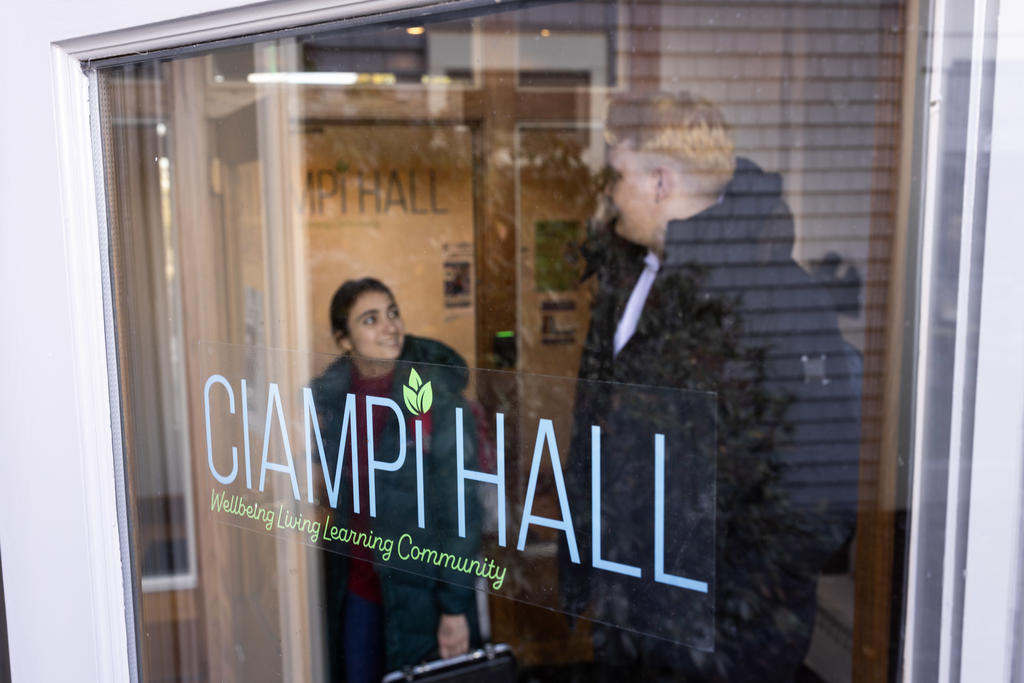Throughout his collegiate career, Martell Audate ’24 counts his role as a resident assistant as one of the highlights. For three years, he’s helped peers manage stress, distractions, and social challenges in order to forge new connections. In spring 2022 Audate heard the College was opening an entire residence hall dedicated to wellness and wellbeing, and he knew he wanted to be part of that community.
“It’s been my best year as an RA,” said Audate on his current work in the new Wellbeing Living Learning Community at Ciampi Hall. “I’ve gotten people to contribute to and involve themselves in dorm and campus life. I want to help them develop connections, which can be contributing factors to making sure they leave here with the growth and knowledge of who they want to be.”
Recent studies show Audate is not alone, with more students choosing wellness-focused lifestyles and forgoing traditional wild party stereotypes associated with the college experience. In response and with societies’ focus on improving mental health, higher ed institutions nationwide are offering special interest housing that support health and wellbeing.
“Everyone is veering more toward wellness now. Even if not totally substance-free, more students want to live a healthier life-style,” said Caroline Robinson ’23, a graduate assistant and member of the student wellness education team.
Substance-free and wellness-focused housing isn’t a new concept. Since the early 1990s, dozens of colleges and universities have offered the option to students who seek a calmer space and more focused space to pursue academic interest. Others have sought substance-free or wellness dorm living due to their own addiction recovery or a family history. Some choose to live there for religious reasons and more college athletes are selecting the housing as they focus on their athletic and academic futures.
“There are more students of all different backgrounds and reasons for choosing to live a substance-free life,” said Joy LaGrutta, associate director of student wellness education.
The demand
According to Edwin Coolbaugh, director of housing operations, student and family demand was part of the impetus for more wellness-focused housing options at Holy Cross.
At Holy Cross, in the spring of 2021, more students and parents were asking for weekend events and activities that did not include alcohol. The results of a subsequent focus group showed that students also wanted a residential space free of party-culture distractions. An application went out to students to apply for the 40 spots available to live on the one floor in Loyola Hall designated as substance-free. Sixty applied.
“They really wanted a program about where they lived and not necessarily learn about being substance free. They created programs and activities that reaffirmed they wanted to be part of a social community that supported substance-free living,” Coolbaugh said.

Jumi Hayaki, professor of psychology, notes that college-age students are particularly vulnerable to unhealthy behaviors when trying to manage negative emotions due to their underdeveloped executive functioning and stress management skills. Neuroscience shows that the brain is still very much in development at this age, but it coincides with a time when older teens and early twenty-somethings are held to adult expectations in behavior, responsibility, and decision making.
“We all have things that we do to blow off steam and some of those might involve use of food or substances. Where we get into trouble is if these are the only strategies and mechanisms that we have at our disposal,” said Hayaki, who studies emotional regulation as related to substance use and eating disorders. “Generationally, this age group is carrying a lot. Without proper coping mechanisms, the consequence of substance use perhaps could be more damaging to the young adult brain.”
The key is having alternatives, she said. In the case of substance-free and wellness residential halls, these communities could provide education on healthy living and emotion management. Access to programs on developing adult life skills, such as nutrition, stress management, social skills, make them attractive to some students, and families.
Building community
Loyola Hall, already known as a quieter dorm on campus, was chosen to pilot the substance-free program during the 2022-2023 academic year.
“People who lived there wanted a calmer space and didn’t want to be part of the drinking culture that involved loud music and noise in the room next to you that was having a party or people coming back from a night out,” Robinson said.
The success of the Loyola living community led to the establishment of Ciampi Hall, the designated wellbeing living learning community in 2023.


